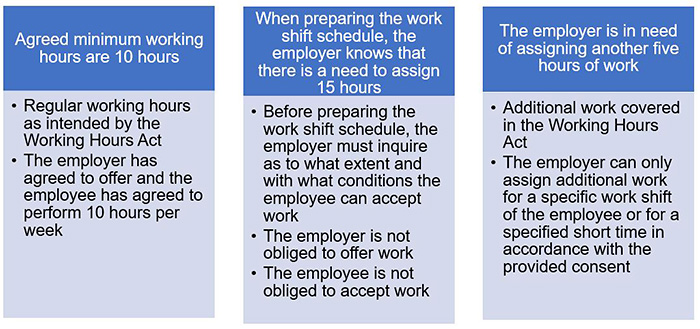

Employment relationship
Variable working hours
The employment contracts with variable working hours do not determine any fixed working hours, but the employee’s working hours fluctuate between the agreed minimum and maximum hours. The number of working hours can be agreed to be, for example, 0–40 hours per week or 10–30 hours per week. When the minimum working hours have been determined at zero hours during a week or a longer period of review, it is referred to as a so-called zero-hour contract. When the employee undertakes to perform work for the employer when separately asked to do so, it is also considered a variable working hours arrangement.
Provisions on variable working hours are included in the Employment Contracts Act 55/2001 and the Working Time Act 872/2019.
Provisions included in these acts contain the following:
- conditions for agreeing on variable working hours (Employment Contracts Act, chapter 1 section 11)
- variable working hours clause (Employment Contracts Act, chapter 1 section 11)
- a report on the principal terms and conditions of employment must be provided when observing variable working hours (Employment Contracts Act, chapter 2 section 4)
- pay during illness (Employment Contracts Act, chapter 2 section 11)
- pay for the period of notice (Employment Contracts Act, chapter 6 section 4 a)
- employee’s consent to additional work (Employment Contracts Act, section 17)
- requirements for shift planning concerning contracts with variable working hours (Working Time Act, section 30a).
To which types of contracts does this apply?
- A working hours clause where no minimum working hours have been agreed upon, but the maximum amount of regular working time has been agreed (for example, 0–40 hours per week)
- A working hours clause where minimum and maximum working hours have been agreed for regular working hours (for example, 15–35 hours per week)
- A contract under which the employee is called to work separately and which includes no agreement on regular working hours (0 hours per week).
And to which not?
- Average working hours and flexible working hours
- Working hours arrangements where the employee is able to decide on their amount of working hours, such as work based on commission or work based on other incentive wage arrangements where the employee can decide on the amount of work to be performed
- In principle, the Working Time Act does not apply in such contractual relations.
- Arrangements where a fixed-term employment is agreed between the parties for each occasion of work
- A so-called framework-agreement model (cf. called to work as needed).
Conditions for agreeing on variable working hours
- At the employee’s initiative (the reason, such as studying, should be recorded in the employment contract)
- At the employer’s initiative when the need for labour force is not fixed
- If, in fact, the working hours prove to be fixed, the variable working hours clause is invalid and the working hours clause must be interpreted as fixed.
- Cannot be agreed at the employer’s initiative to be fewer than required by the employer’s actual labour need.
Working hours clause must be reviewed annually
- At least every 12 months, the employer must review the fulfilment of the working hours clause agreed in the employment contract.
- The employer must notify the employee when the working hours clause is up for review.
- At the request of the employee or their representative, the employer shall provide a written account of the outcome of the review and its grounds.
- If the report is not made available, the employee can ask for help from the occupational safety and health authority.
- If the number of hours worked during the review period and the employer’s need for labour indicate that the minimum working hours agreed in the employment contract could be determined to be higher, the employer shall, within one month of the completion of the review, offer the employee an agreement to amend the working hours clause so that it corresponds to the result of the review.
- The employee may refuse to change the working hours clause.
- If the employer stops offering the work altogether, the employer must, at the employee’s request, explain in writing the reasons for the reduction in work offered.
Report on the principal terms and conditions of employment
- Information on working hours must be included in the employment contract or in a written report of the principal terms of employment.
- If the employee’s working hours are variable, the employer must also report the following:
- in what circumstances and to what extent the employer requires labour
- description of the situations when the employer is probably in need of work contribution
- non-binding, informative only
- days and times of the week during which the employer may commission work in accordance with section 30a of the Working Time Act without the employee’s consent for each occasion.
- in what circumstances and to what extent the employer requires labour
Pay during illness when observing variable working hours
- The employee is entitled to pay during illness, if he or she had would have been working when fit for work.
- In practice, this can be demonstrated on the basis of markings in the work shift schedule, for example.
- If the employee’s shifts have not been marked in the work shift schedule, the employee is entitled to pay during illness, when:
- a shift has been agreed upon otherwise, or
- under the circumstances, it can otherwise be taken for granted that the employee would have been at work when fit for work (for example, always at work on Mondays).
- Exceptions concerning pay during illness can be made on the basis of a collective agreement.
Pay for the period of notice when observing variable working hours
- The general provision is the usual pay.
- If the amount of work offered by the employer during the period of notice is less than the average amount offered in the last 12 weeks preceding the last work shift, the employer must compensate for the loss in income caused by the smaller amount of work.
- Not entitled to pay when the employment has lasted for less than one month.
The provisions concerning working hours when observing variable working hours
Consent to additional work
- Additional hours can be required in addition to the working hours indicated in the work shift schedule only with consent from the employee
- The consent is restricted and it can only be given
- specifically for each work shift, or
- for short periods (such as peak hours).
Employee’s consent for shifts entered in the shift list
- For minimum working hours (for example, 10–30 hours per week), the employee’s position is equivalent to that of an employee observing fixed working hours.
- In the case of variable working hours agreements, the employee’s consent is required to enter a shift in the shift list if the working hours would:
- be outside the weekdays or times referred to in Chapter 2, section 4, subsection 3, paragraph 9 of the Employment Contracts Act
- exceed the minimum variable working hours agreed in the contract.
- How to get consent has not been specified.
- For example, an employee may tell their employer that they are prepared to accept shifts for a specified period of time outside the times or days of the week that have been specified in a written report concerning the terms of employment.
- In addition, they may consent to accepting hours exceeding the minimum working hours agreed in the employment contract.
- The employee also has the right to set limits for their consent, such as letting the employer know that the employee cannot work shifts at a certain time.
Exceptions to consent can be made on the basis of a collective agreement.
Example: Working hours in accordance with the contract are 10–30 hours per week:

This website is part of the European Commission's Your Europe portal. Did you find what you were looking for?


